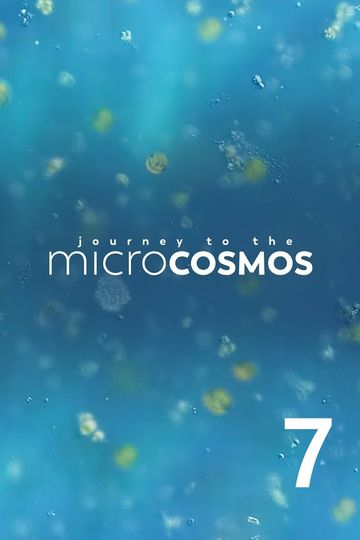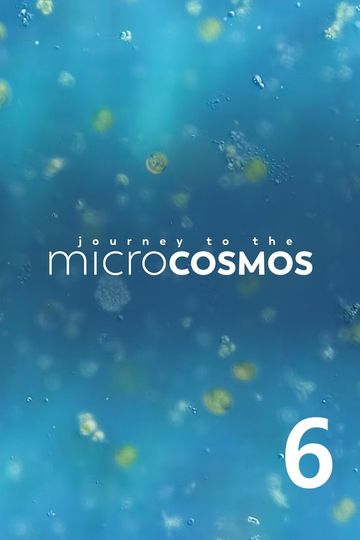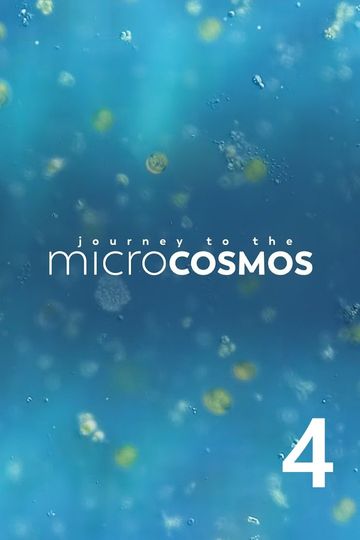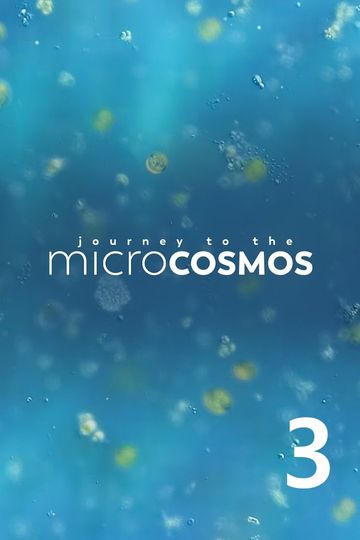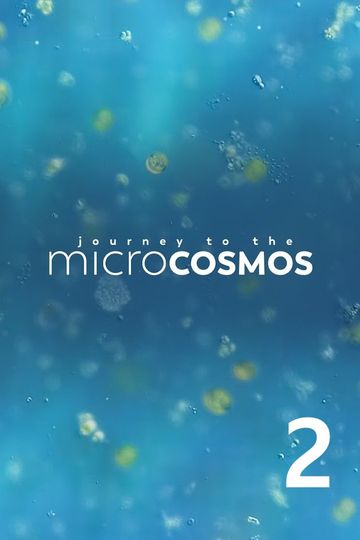Season 6 Episodes
1. Giant Microscopic Cannibals
Every experiment has to start somewhere. This one began with a container full of dying microbes, and the five cute, pink ciliates called blepharisma that James, our master of microscopes, accidentally turned into a group of cannibals.
2. How Many Cells Are in a Microscopic Animal?
We’re starting this episode out with a question that we’re never going to have a good answer for: how many cells do animals have? How could we ever hope to count all those cells in each of those animals? And how could we even begin to assume that the amount of cells in one individual is going to be the same for all the other individuals?
3. The Remarkable Mystery of Land Plants
Somewhere around 470 million years ago, something happened that shouldn’t have been particularly striking. An algae found its way onto land. This algae turned the lands of this earth green, altered the chemistry of our atmosphere, and created homes for future life. This algae would give rise to all of the land plants we know of today.
4. There's More Than Coral at the Coral Farm
When you’re in the business of hunting for microbes, sometimes you have to send some weird emails. That’s why James, our master of microscopes, sat down one day to send his own strange request to the people at Coralaxy, a coral farm in Germany.
5. We Finally Found the Elusive Bristle Worm!
We’ve spent most of our journey through the microcosmos seeking out the organisms that are too small to see with just the human eye. The bacteria, the ciliates, the tardigrades. Part of what makes them so exciting to find is that they are so tiny. Every moment we spend with one of these organisms is a peek into something exceptional in our experience of the world, and it’s the result of how much work James, our master of microscopes, has put into hunting down as many microbes as he can.
6. Putting Coral Under the Microscope
James, our master of microscopes, recently received a package from a coral farm in Germany. We’ve explored some of the microscopic creatures and bristle worms that were living and thriving in those packages in previous videos. But today we’re here to focus on the main event: the corals.
7. How Brownian Motion Helped Prove the Existence of Atoms
We’re going to see a type of motion over and over again because it’s all over the microcosmos, found in and around many different types of organisms. And this kind of random motion may seem almost too trivial to discuss, but this motion that you see is a proof of something fundamental not just to life, but to existence itself. This movement… is proof… of atoms.
8. How to Not Kill an Extremely Rare Microbe
For an activity that mostly involves sitting and staring, microscopy is a surprisingly high stakes task. On the other side of the lens are drops full of potential, a multitude of worlds to unravel and examine. But they’re also fragile worlds, easy to fracture and lose with just a tiny slip of the hand. The stakes only get higher when you’re dealing with an organism so rare that it’s only been reported a few times since it was first discovered in 1901.
9. Mouthless Parasites That Make Their Home In Worm Guts
You’ve heard those worm horror stories, right? Stories of painful stomach cramps or diarrhea or nausea that eventually turns out to be caused by some worms that have taken up residence in someone’s intestines. It’s so terrifying and wild to think of something so much smaller than us causing so much havoc. But, what if worms had to worry about their own guts being taken over by a parasite?
10. Can This Baby Rotifer Escape Before It’s Eaten Alive?
This Loxodes magnus is large, so large that it was able to eat a rotifer, those funny animals we often see getting bullied by their single-celled neighbors. Except, that rotifer is moving. It’s alive, twisting and turning inside of the food vacuole it’s been stuffed into, and starting to fight back.
11. Bryozoa: Moss Animals That Are Defined by Their Butts
At first glance, they seem a bit more like plants or a series of flowers with thin, elegant petals. But no, they are indeed an animal. One that has the dubious honor of being defined largely by its anus.
12. Getting to the Root of Nitrogen Fixation
James, our master of microscopes, is not a farmer. He is, to put it simply, fascinated by microbes. And that may lead him to strange places and cause him to grow tanks full of weird things. But he is not a farmer.
13. A Two-Headed Ciliate and Other Adorable, Dead, and Extinct Things
The theme of today's episode is pretty simple: things we never thought we’d be showing you, but here we are.
14. The Aquatic Snails That Leave a Path of Destruction
It’s often said that one person’s trash is another person’s treasure. And surely there is no greater proof of that than the home of our master of microscopes, James. All along the windowsills and bookshelves are jars and tanks full of samples gathered from ponds, lakes, and oceans. And even his cabinets and drawers and bathroom hold stockpiles of what he’s found. There is just one problem though... the snails.
15. These Squishy Dots Move So Fast You Might Miss Them
From our vantage point, as relatively large organisms, it can be easy to overlook the microcosmos, because it’s simply too small to see. It floats in front of our eyes at all times, and yet we cannot make out details until we turn to other tools.
16. Our Tardigrades Got Stuck in a German Post Office
Tardigrades have been through a lot. They’ve been sent to the moon. They’ve had the moisture sapped out of them. At times, they’ve been in extreme heat. And at other times, they’ve had to contend with extreme cold. Well, today, we’ve got a new one for you. A harrowing journey for these tardigrades that have taken them through, what we assume, must be the worst thing that tardigrades have yet been subjected to. These poor, enduring tardigrades got stuck in postal security.
17. These Walking Ciliates Are Frustrating
The ciliates we’re going to talk about today are kind of…frustrating. At this point in our journey, we’ve gotten used to the fact that the microcosmos is an indecipherable mess at times, filled with organisms that look like each other, and who have familial relationships that seem obvious but then turn out to be a figment of our own limited imaginations. And these ciliates are yet another entry in the long-standing saga of ever-changing taxonomies that define our understanding of microbial species. The plot twist is inevitable.
18. Water Mites: Sticky Dancers with Crystal Poop
The microcosmos might seem like a safe place from a surprise spider attack, but it would be misleading to pretend that it’s completely free of spider-like sightings. Because even at this small scale, you could find yourself subject to an ambush of the arachnid sort.
19. We Accidentally Grew Crystals
Usually on Journey to the Microcosmos, we spend our time looking at living organisms, things like insects, plants, and microbes that move and breathe and grow and die. But today, for these first few moments, these are the only living organisms we’ll be showing you, a montage of creatures whose bodies all share one very eye-catching trait: crystals.
20. Ghost Fleas: Tiny See Through Cyclopses
Depending on your love of horror stories or your belief in the supernatural, it might be easy to convince you that lakes are full of ghosts. That as you plunge deeper into these lakes’ depths, you’ll come across translucent bodies that come alive when nighttime sets in; with its limbs all packed close to the head, wrenching open and closed like scissors that propel our spectral friend in jarring motions.
21. Bacteria That Only Want To Head North
When James first saw these bacteria, all he knew is that they came from a sample taken from a Portuguese beach. And on the slide, the bacteria were swimming in a stark line. And that gave James an idea. He took out his phone and opened up his compass app. Then he placed the phone on the microscope stage to see what direction the bacteria were swimming in. And he found that the bacteria were all swimming north.
22. The Shared Doom of Microscopic Hitchhikers
Our oceans and lakes are filled with copepods, a myriad of small crustacean species that might float as plankton or infect other creatures1. And as they’re living in whatever manner best suits them, some copepods—like our friend here—become more than just their own creature. They become a surface, a place for someone else (or something else) to settle down upon.
23. Kentrophoros: The Mouthless Ciliate With a Back Full of Snacks
This is kentrophoros, a ciliate that James—our master of microscopes—had been searching for, receiving samples from all over the world in the hopes of finding it gliding around. When you first look at it, it doesn’t seem particularly special. But there are two things that the kentrophoros is famous for. The first is its lack of a mouth. The second is its coat of bacteria.
24. These Rotifers Glue Themselves Together
As animals, we owe a lot to the single-celled organisms that came before us. These are the organisms that laid the chemical groundwork for how we live, from the DNA and proteins within them to the molecules they released into the environment. There’s something humbling about looking at our hands or feet and imagining the mixture of cells within them, and realizing the lessons that keep those cells bound together physically and biologically are rooted in a very ancient study in cooperation.
25. Why Are These Single-Celled Organisms So Large?
26. Sand Is Full of Life and Death
27. The 18th Century Tardigrade Debate
28. Is the Mitochondria Always the Powerhouse of the Cell?
29. This Extremely Rare Ciliate Has Only Been Seen Four Times
30. How We Got The DNA From This Extremely Rare Ciliate
31. A Microscopic Tour Through A Norwegian Fjord
Sometimes our journey through the microcosmos feels like an expedition, a voyage filled with deep dives into the masses of organisms basking under the glow of our microscope. So what does it mean when you don’t find anything. When you gather your samples and excitedly prepare them for the microscope, only to find a landscape lacking in the life you expected to find?
32. The Illuminating Reason Perenema Curl Up Into a Ball
Watching this Peranema feels a bit like watching a cat waffling back and forth between whether or not it wants to take a nap. Sometimes the Peranema stretches, its body undulating into an elongated, indescribable geometry as its flagella twitch like whiskers. And then, sometimes, it curls up into a cozy circle, tucking one end into itself the way any feline friend you might know curls up around the perfect beam of sunshine.
33. The Collotheca Doesn’t Mind Eating Its Own Babies
Imagine that this is the beginning of the last thing you’ll ever see, an empty landscape with thin lines scratched across it. But those lines suddenly sharpen and gather into a dense mass that spreads from the crown that sits atop a giant, studded with greens and yellows. A giant that is in search of one thing: food.
34. The Indecisive Evolution of Gastrotrichs
The Gastrotrich has long been a personal favorite microbe of several members of the Journey to the Microcosmos crew. But while we were able to see a lot with the microscopes we had at the time, James—our master of microscopes—has made some significant upgrades since then and this means that we are now able to see gastrotrichs in a whole new light.
35. How Electricity Brings Order To Chaos
Science is built on questions. So let’s start today with one: what do you think happens when you set off an electrical spark in the microcosmos?
36. The Microcosmos Is Made of Star Stuff
If you’ve been with us on our journey for a while, you’ve probably heard us say the phrase “we don’t know” a lot. The microcosmos doesn’t guarantee answers, and we’ve often found ourselves looking at some unusual behavior or beautiful form that represents some fascinating, unresolved mystery.
37. Your Mouth Is A Cave For Microbes
You may not want to think about it this way, but your mouth is really just one giant, wet cave for microbes. From the perspective of bacteria, your mouth is not a tool. It is a home. It is a place that provides shelter and food, but it is also a place that can pose many threats. And the interplay between our mouths and the microbes that take up residence within them ends up, inevitably, affecting our own health.
38. Microscopic Space Travelers
This might not look like much. But every day, tiny little things like this are raining down on our planet. Each one is small, about a millimeter across. But over the course of a year, each individual piece that makes its way to Earth’s surface adds up to around 30,000 tons.
39. These Microbes Wear Chain Mail Made From DNA
The microcosmos is not always a graceful space. Sometimes an organism just needs to get around the way it gets around, even if that means looking like a swimming elephant head with a truncated snout at one end and a rat tail at the other.
40. How Does Yeast Make Bread?
As you’re wandering through the aisles of the grocery store, you might find your attention caught on any number of things. Frozen pizza. Cupcakes. Wine. And as delicious as all of those are, we doubt that any of them undergoes as spectacular of a transformation as a packet of instant yeast does when you shoot lasers at it.
41. How Do Microbes Make Decisions?
Microbes are not just blobs. They are very well-evolved biological machinery, the product of eons of evolution that have exposed their ancestors and them to different homes and food and threats.
42. How Your Blood Keeps You Alive
Blood is a useful substance, not just for our life, but for our way of thinking. It signifies life, but also accompanies death. It unites those who share it, but in doing so it divides others. It runs hot, it runs cold. Whatever it is we need to describe, blood is there for us to project onto, flowing through us.
43. Can Bacteria Eat Plastic?
Our world today, the one that we have constructed, feels as if it runs on plastic. It is a building block in our bags, our bottles, clothing, toys, the list could go on and on. Plastic has become so prevalent that it’s almost impossible to escape.
44. Lichen: The Mysterious Love Child of Fungi and Algae
A useful principle in the story of life is that you should never underestimate algae or cyanobacteria. They’ll just always manage to surprise you, and more importantly, to remind you that everything you have comes down, eventually, to them.
45. The Microcosmos Is A Very Stressful Place
Do microbes ever feel fear? Or concern? Or trepidation? While they can’t exactly tell us, they probably don’t– at least not in ways that we could understand. But we can tell that they definitely experience stress.
46. These Mites Are Probably On Your Face Right Now
You might wonder why we would care if a demodex has a butthole or not. Well, we care because they live on our face.
47. The Incredible World of Bacterial Communities
These particular little green organisms show up in the background of other organism’s lives, providing pops of color among other debris. What you are looking at is not a single organism, but rather a gathering of them. Those green bits are consortia of bacteria.
48. The Tube-dwelling Architects Of The Microcosmos
Every time we see diatoms, we have to give it to them: they’re just simply stunning. They’re single-celled and major producers of the oxygen we breathe, but the real reason we love seeing them is because of their frustules.
49. How To Kick Off Your Microscopic Journey
One of the most common questions we get asked here on Journey to the Microcosmos comes from all of you who are thinking of starting your own microscopic journeys and want a little nudge in the right direction. The question is: what microscope should I use?
50. Unboxing Our Microcosmos Microscope!
51. The Complicated Sex Lives of Hydra
If we were to write a fable to get this moral across, it would have to star the freshwater cnidarian called the hydra. Because in the hydra, the question of butts connects to the ambiguities of immortality, which in turn relates to the befuddling matter of sexual reproduction.
52. When Is A Fungus Not A Fungus?
Oomycetes are one of the more unusual-looking microbes we’ve seen in the microcosmos. It looks more like a coral reef painted by an artist inspired by Gustav Klimt and a pile of trash. And if you saw that painting hanging in the museum, you might pass it by without thinking much of its subject.
53. The Cryptic Origins of Yogurt
The microcosmos is home to many unusual partnerships. Life is, after all, just relationships, each of which build upon one another like strokes of paint in an epic tableau of ecology, epidemics, and yogurt?
54. Why Beggiatoa Are Stuffed Full Of Sulfur
There’s a few things that give Beggiatoa away. The first is the simple serpentine shape of their bodies, and the second are those little dots inside of them. They look like bubbles, but they’re actually sulfur granules.



























